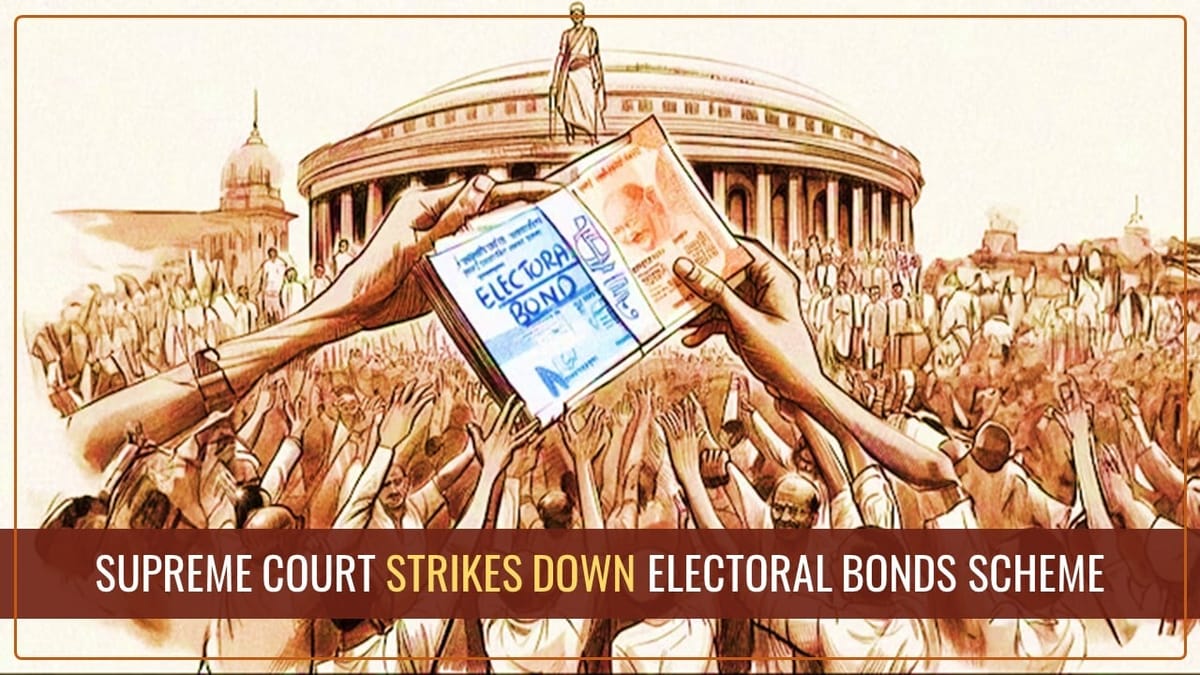Note4Students
From UPSC perspective, the following things are important :
Prelims level: na
Mains level: The electoral bonds scheme

Central Idea:
The Supreme Court’s recent decision to strike down India’s electoral bonds scheme marks a significant victory for transparency in democracy. The judgment highlights the importance of ensuring that political funding is transparent and accountable to the public.
Key Highlights:
- The Supreme Court’s ruling on February 15, 2024, declared the electoral bonds scheme unconstitutional due to its lack of transparency.
- The scheme allowed undisclosed corporate funding of political parties, removing previous limits and potentially enabling influence peddling.
- Amendments to the Reserve Bank of India Act and other laws to introduce electoral bonds were deemed arbitrary and violative of fundamental rights.
- The court ordered the State Bank of India to cease issuing electoral bonds and mandated disclosure of all previously issued bonds to the Election Commission.
- The judgment underscores the importance of judicial review in upholding democratic principles and protecting constitutional rights.
Key Challenges:
- The influence of money in elections remains a challenge, including the use of black money and bribery.
- The lack of independent voting in India’s legislative process allows ruling parties to pass laws without sufficient scrutiny or consultation.
- Political parties’ resistance to transparency raises concerns about their commitment to serving the public interest.
Main Terms from the article:
- Electoral bonds: Instruments for anonymous political donations introduced in India.
- Transparency: Openness and accountability in political processes and decision-making.
- Judicial review: The power of courts to assess the constitutionality of laws and government actions.
- Fundamental rights: Constitutional protections for individual freedoms and equality.
- Campaign funding: Financial support for political parties and candidates during elections.
Important phrases for mains answer writing:
- “Transparency is the basis of campaign funding.”
- “The judgment restores transparency in political funding.”
- “The ruling prevents undue influence on the government by corporate donors.”
- “The power of judicial review is crucial for upholding democracy.”
- “The price of democracy is eternal vigilance.”
Quotes for value addition:
- “The electoral bonds scheme was opaque.”
- “The judgment prevents crony capitalism from influencing political parties.”
- “The ruling party bypassed transparency with electoral bonds.”
- “The power of judicial review is precious.”
- “We need political parties, but it is up to us to ensure they work for the good of society.”
Useful Statements:
- “The Supreme Court’s decision reaffirms the principle that transparency is essential for democracy.”
- “The ruling highlights the need for robust mechanisms to prevent undue influence on political processes.”
- “Public scrutiny and vigilance are vital for holding political parties accountable.”
- “The judgment sets a precedent for upholding constitutional rights in electoral matters.”
- “Citizens’ engagement is crucial for ensuring that political parties serve the interests of the nation.”
Examples and References:
- The case of electoral bonds exemplifies the tension between transparency and political expediency in India’s democracy.
- Similar challenges with campaign finance transparency have been observed in other democracies worldwide.
- Instances of corporate influence on policy-making underscore the importance of regulating political funding.
- Civil society organizations and activists have played a critical role in advocating for transparency in political funding.
- Past instances of electoral malpractice highlight the need for stronger legal safeguards against undue influence.
Facts and Data:
- The Supreme Court’s ruling was issued on February 15, 2024.
- Electoral bonds were introduced as a means of anonymous political funding.
- Amendments to various laws facilitated the implementation of the electoral bonds scheme.
- The Election Commission of India raised concerns about the potential misuse of electoral bonds.
- The judgment requires the State Bank of India to disclose all previously issued electoral bonds to the Election Commission by March 6, 2024.
Critical Analysis:
- The electoral bonds scheme represented a departure from established norms of transparency in political funding.
- The Supreme Court’s decision underscores the judiciary’s role in upholding democratic principles and constitutional rights.
- The ruling highlights the challenges of balancing political expediency with the need for transparency and accountability.
- Political parties’ resistance to transparency raises questions about their commitment to democratic values.
- The judgment sets a precedent for future legal challenges to electoral practices that undermine transparency and accountability.
Way Forward:
- Strengthening legal safeguards to ensure transparency and accountability in political funding.
- Promoting civic engagement and public awareness to hold political parties accountable.
- Enhancing mechanisms for independent oversight and regulation of campaign finance.
- Encouraging broader political reforms to address systemic issues of corruption and undue influence.
- Emphasizing the importance of upholding democratic principles and constitutional rights in electoral matters
Get an IAS/IPS ranker as your 1: 1 personal mentor for UPSC 2024
